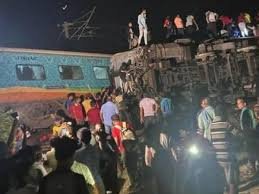In a devastating accident that occurred in Odisha’s Balasore district, three trains were involved, resulting in the loss of over 280 lives. The incident, which took place at Bahanagar, involved the Bengaluru-Howrah superfast express, the Coromandel Express, and a goods train on separate tracks. The repercussions of this major accident included the cancellation and diversion of numerous trains.
The tragic event unfolded when several coaches of the 12864 Bengaluru-Howrah superfast express, en route to Howrah, derailed at Bahanagabazar and fell onto the upline. A railway official confirmed that these derailed coaches collided with the 12841 Shalimar-Chennai Coromandel Express, causing its coaches to also capsize. To compound the situation further, a goods train was also involved in the accident as the coaches of the Coromandel Express hit its wagons after derailing.
The aftermath of this massive accident resulted in significant disruptions to train services. Many trains had to be canceled, and others were diverted to alternate routes. The cancellation list included trains such as the Howrah-Puri Express, Howrah-Sir M Visvesvaraya Terminal Express, Howrah-Chennai Mail, Shalimar-Puri Superfast Express, and several others.
The diversion of trains was necessary to ensure the safety and smooth operation of rail traffic. Trains like the Puri-New Delhi Purusottam Express, Puri-Rishikesh Kalinga Utkal Express, Puri-Patna Special, Chennai-Howrah Mail, and Vasco da Gama-Howrah Amaravati Express were rerouted via different paths. The diversion of these trains aimed to mitigate the impact of the accident and provide alternative transportation options to passengers.
The South Eastern Railway issued a notification outlining the comprehensive list of diverted trains in response to the Odisha accident. Approximately 34 trains on the route were redirected to minimize disruption and facilitate the movement of passengers.
The magnitude of this accident highlighted the need for immediate action and safety measures. Railway authorities and rescue teams worked tirelessly to manage the situation, provide medical assistance to the injured, and initiate the recovery process. Investigations were launched to determine the causes of the derailment and collision, with a focus on preventing similar incidents in the future.
The tragic incident and its aftermath underscored the importance of safety precautions and regular maintenance of railway infrastructure. The railway authorities, in collaboration with relevant stakeholders, must prioritize the implementation of robust safety protocols to safeguard passengers and prevent accidents of such magnitude.
As the affected region grappled with the consequences of the accident, support and condolences poured in from across the country. Efforts were made to assist the families of the victims and provide them with the necessary support and resources during this challenging time.
It is crucial for the railway authorities to conduct a thorough investigation, identify any lapses in safety measures, and take appropriate corrective actions. By doing so, they can restore public confidence in the railway system and ensure the well-being of passengers.
In conclusion, the three-train accident in Odisha’s Balasore district caused significant disruptions in train services. The derailment and subsequent collisions resulted in the cancellation and diversion of several trains. The railway authorities, along with rescue teams, are working diligently to manage the situation and provide support to the affected individuals. Moving forward, it is imperative to prioritize safety measures and preventive actions to enhance the overall security of the railway network.


